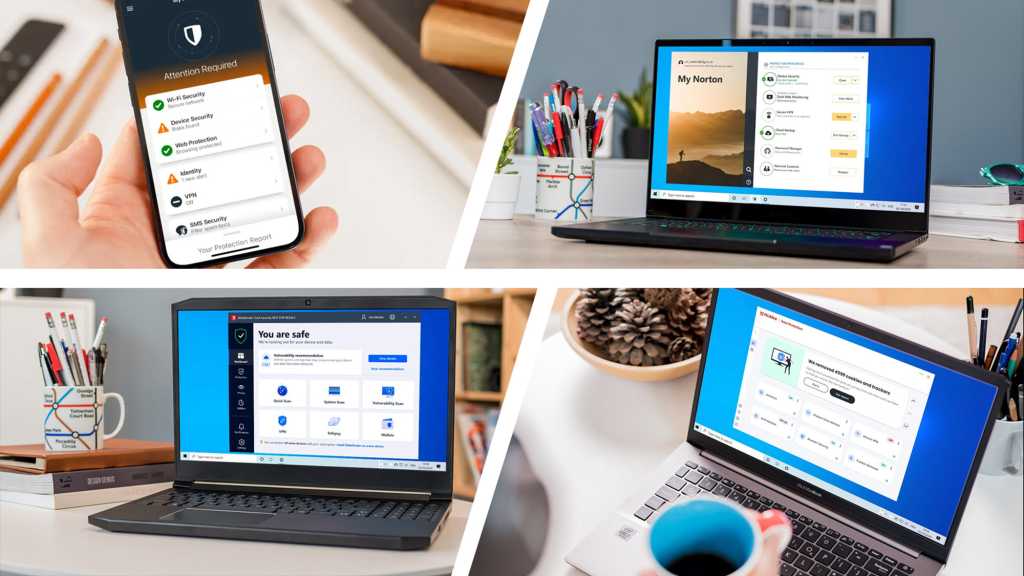One upon a time, antivirus apps did only that: protect you from viruses. They still do that but a lot more alongside it these days.
Think of modern antivirus as all-round security software, keeping you safe while using any device, anywhere. Some also include features such as VPNs and password managers to add value.
Traditionally, you might also think of antivirus as a program for your computer. All of the six services included here might be best known for their Windows 10 or 11 apps, but they’re also available on an iPhone or Android phone.
That’s arguably where the bigger security risk lies, given many people spend several hours on a smartphone each day.
Even if you’re extra careful online, it can be difficult to avoid scams these days. They’re hidden in email attachments, social media links and even messages from someone impersonating a trusted friend or family member.
If you happen to fall foul to a cybercriminal, your personal details could be used to ruin your reputation or empty your bank account. Given how sophisticated scams can be these days, common sense simply isn’t enough.
That’s where top-notch security software comes in, which goes far beyond simply identifying and removing viruses and malware. It can be used to warn you of fake websites (and links in messages leading to these sites), remember unique passwords for all online accounts (warning if any may have been compromised), keep children safe online and much more.
And the key thing is that they’re available across all your devices, meaning you can stay safe while using a phone, tablet, laptop or desktop PC. While all of the services below are subscription-based, they offer good value for money, especially if you’re looking for something to protect the whole family.
Note: Authorities such as the FCC and BSI currently discourage the use of Kaspersky products, and Tech Advisor owner Foundry has also suspended its business partnerships with Russian companies. Although we haven’t removed the content about Kaspersky from our websites, you won‘t find any purchase links for these products.
Best Antivirus 2024
1. Norton 360 Deluxe
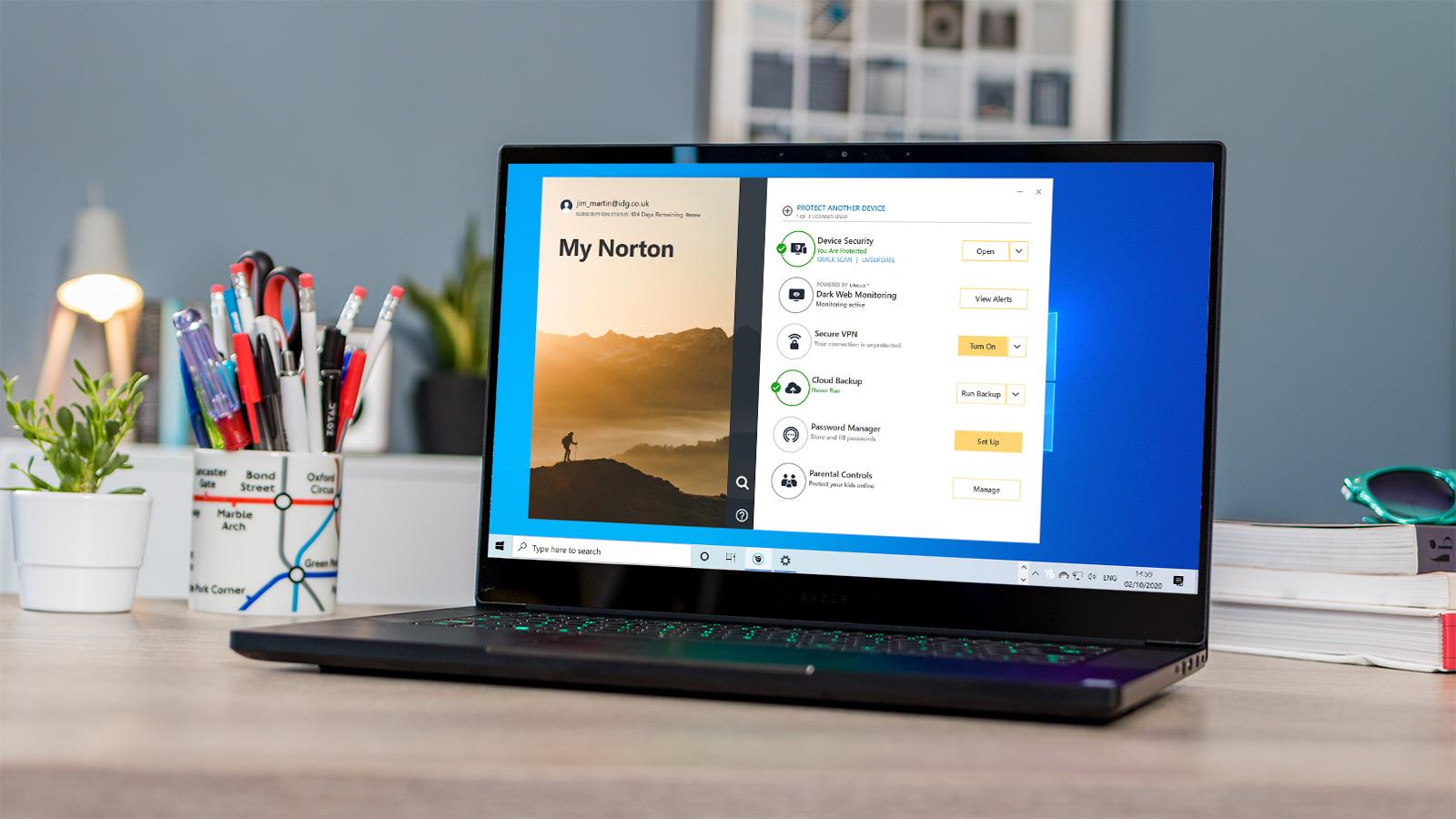
Pros
- Excellent malware protection
- ID protection
- Unlimited-use VPN
Cons
- Backup only for Windows
- Limited features on iOS and macOS
Norton 360 Deluxe is so called because it really does offer all-round security that can protect your key devices as well as alert you if your logins are ever found for sale on the dark web, giving you an early heads-up of potential trouble and the opportunity to change your passwords.
Available for Windows, Mac, iOS and Android, some of the highlights include top-notch antivirus performance, phishing protection, and warnings of dangerous websites, a no-limits VPN service and a password manager, plus cloud backup storage and performance tools to help speed up your computer.
However, not all of those features are available on all devices. You won’t find parental controls for macOS, for example, and cloud backup is only for Windows. As usual, there aren’t a whole lot of features for iPhones.
The good news is that the core malware protection is superb. In AV-Test’s most recent report, Norton 360 performed very well across the three categories: protection, performance and usability.
2. McAfee Total Protection
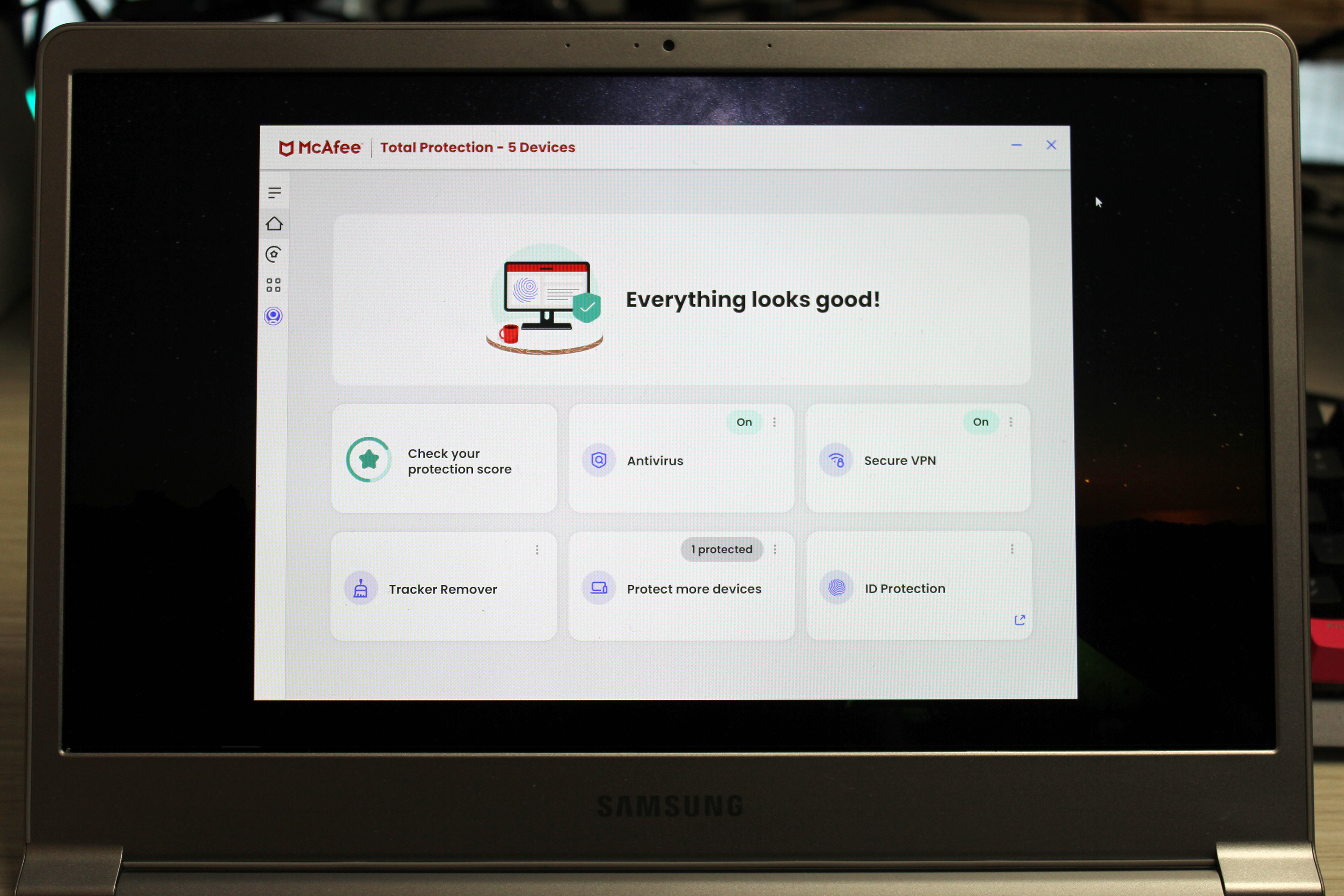
Pros
- Very user-friendly
- Unlimited-use VPN
- ID protection service
Cons
- Ineffective parental controls
- No kill switch in VPN
- File Lock being removed
McAfee Total Protection has an airy, easy-to-understand user interface and an integrated VPN service which offers 50 locations and unlimited data. Many security suites have a VPN which limits you to just a few hundred MB per day.
McAfee’s malware protection is among the best, and it’s easy to know when you need to do something to protect your PC (such as updating apps) thanks to useful, comforting alerts.
With ID protection, and subscription options covering all your devices, Total Protection can be great value if you have that many to protect. The price above is for five devices, but the extra cost to protect more is very reasonable.
If you’re in the US, get Total Protection here.
For those in the UK, get Total Protection here.
3. Bitdefender Total Security
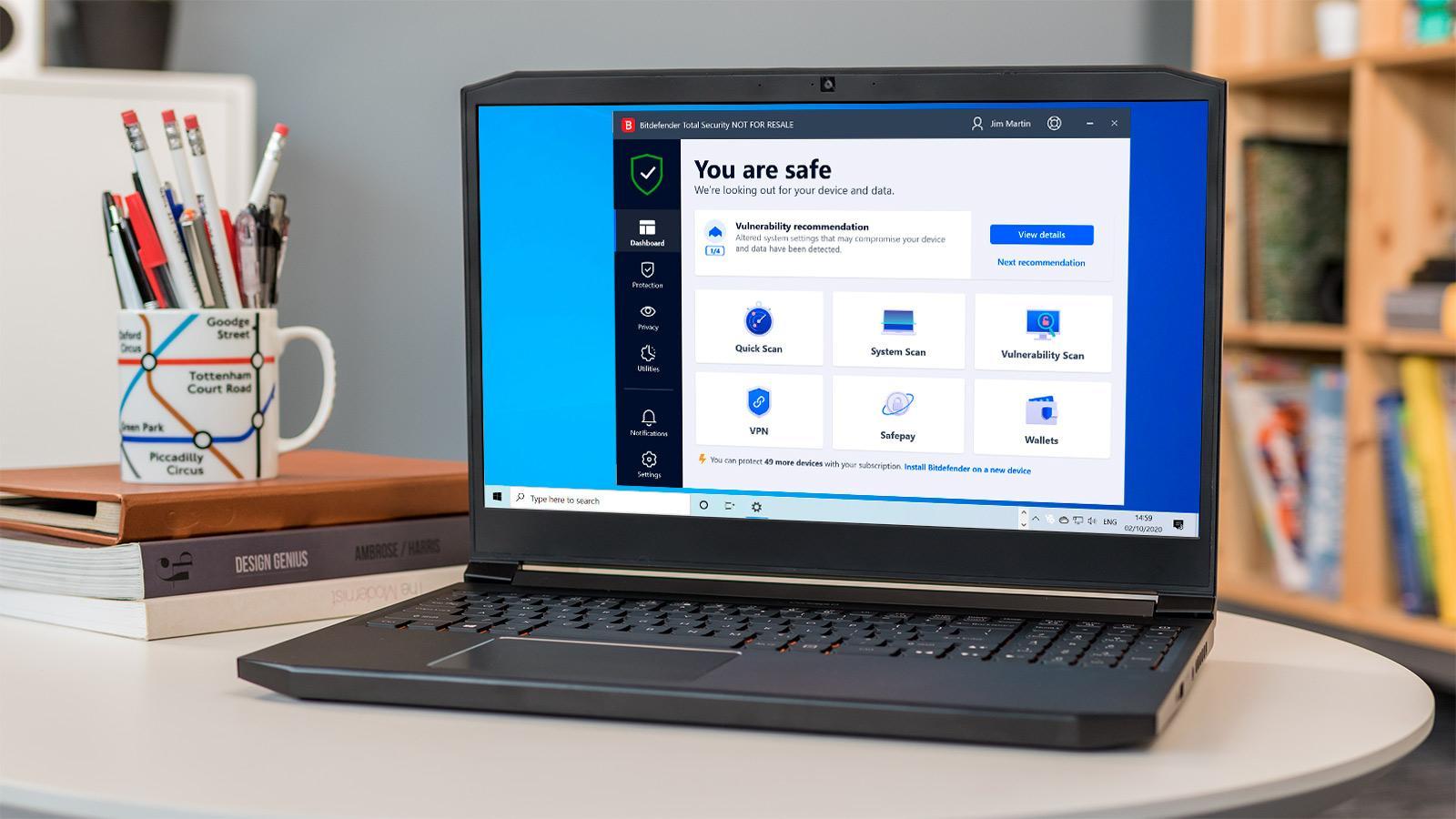
Pros
- Excellent malware protection
- Useful management portal
Cons
- VPN limited to 200MB per day
- No identity protection
Bitdefender’s Total Security is an excellent product. Like most rivals, Bitdefender charges a lot less than the standard price for the first 12 months, bringing it down to £34.99/$39.99 and this covers up to five devices.
In AV-Test’s latest report, Bitdefender’s Internet Security caught 100% of the 0-day malware attacks thrown at it, and also scored top marks for overall protection and performance.
In terms of extra features, you get a cross-platform password manager, but parental controls are basic, and there’s still no ID protection. The VPN is really only a trial version that lets you have 200MB of data per day, which means it’s hard to recommend Bitdefender over McAfee and Norton, given that it costs the same.
You’d need to upgrade to the full version of the VPN if you want unlimited data (but there are better choices in our VPN round-up if you’re prepared to pay for one).
4. McAfee+
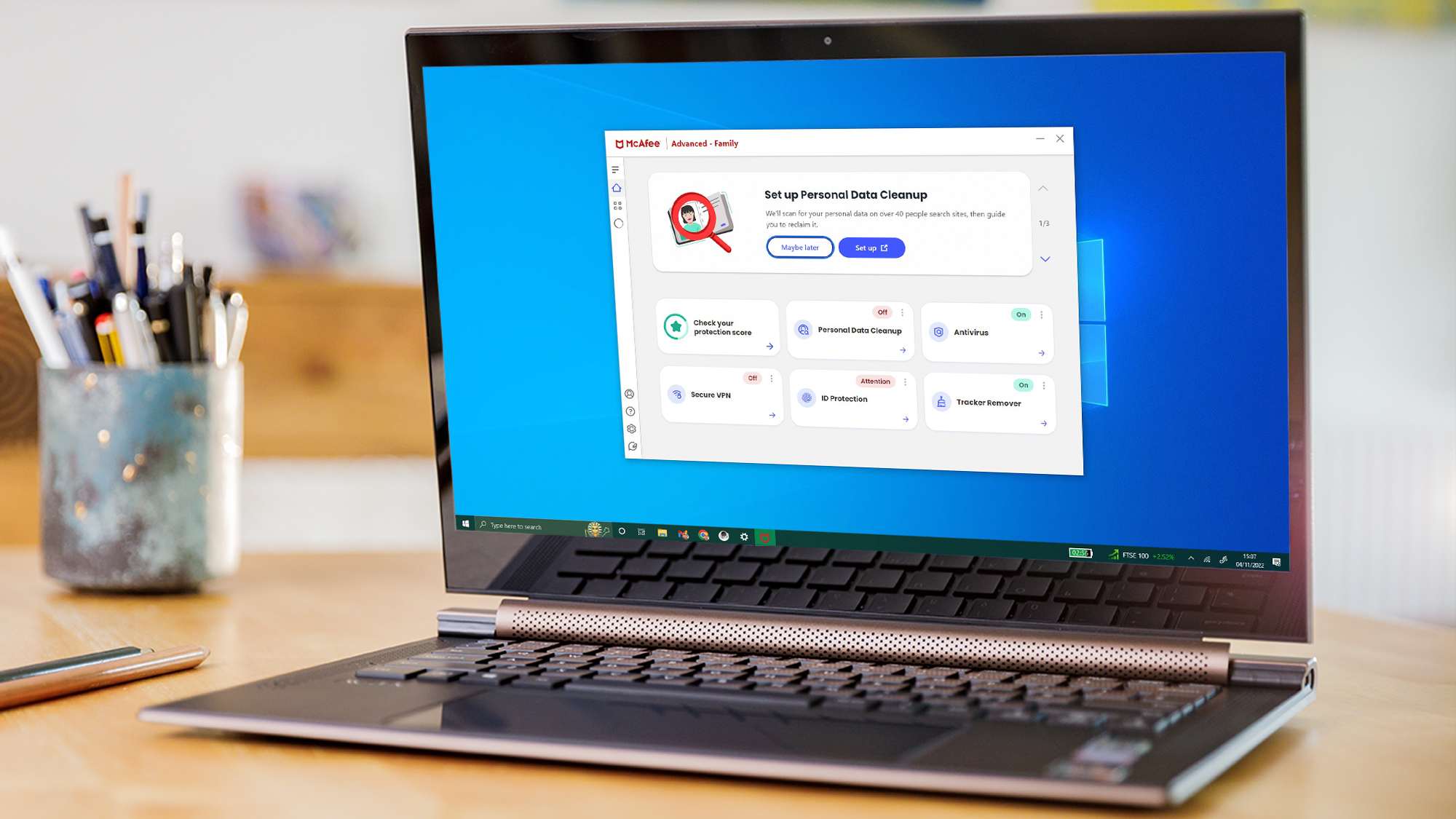
Pros
- Simple to use, even if you're not tech-savvy
- Unlimited device support included
- VPN with unlimited traffic included
Cons
- No option to pay monthly
- VPN doesn't unblock streaming services
- Some features aren't available in some countries
There’s little doubt that simple antivirus protection isn’t enough in 2024. This is why McAfee+ exists: it doesn’t only protect your files and ID: it’ll help you recover from hacks, ID theft and even lost wallets.
In the US there’s the option of an Ultimate tier (which is better than ‘Advanced’ that’s available elsewhere). This adds up to $1m of cover for identity theft and stolen funds, which offers the sort of peace of mind you won’t find with most other security apps.
McAfee isn’t alone in having a ‘mega-suite’, though. Norton offers a similar one that includes the same individual protection in the event of a breach or scam.
What we love about McAfee+ is that, on top of this, it has ‘gamified’ security to encourage good behaviour without lots of unnecessary jargon, making it far more accessible to the less tech-savvy who want to do the right thing but don’t know where to start.
5. Avast One
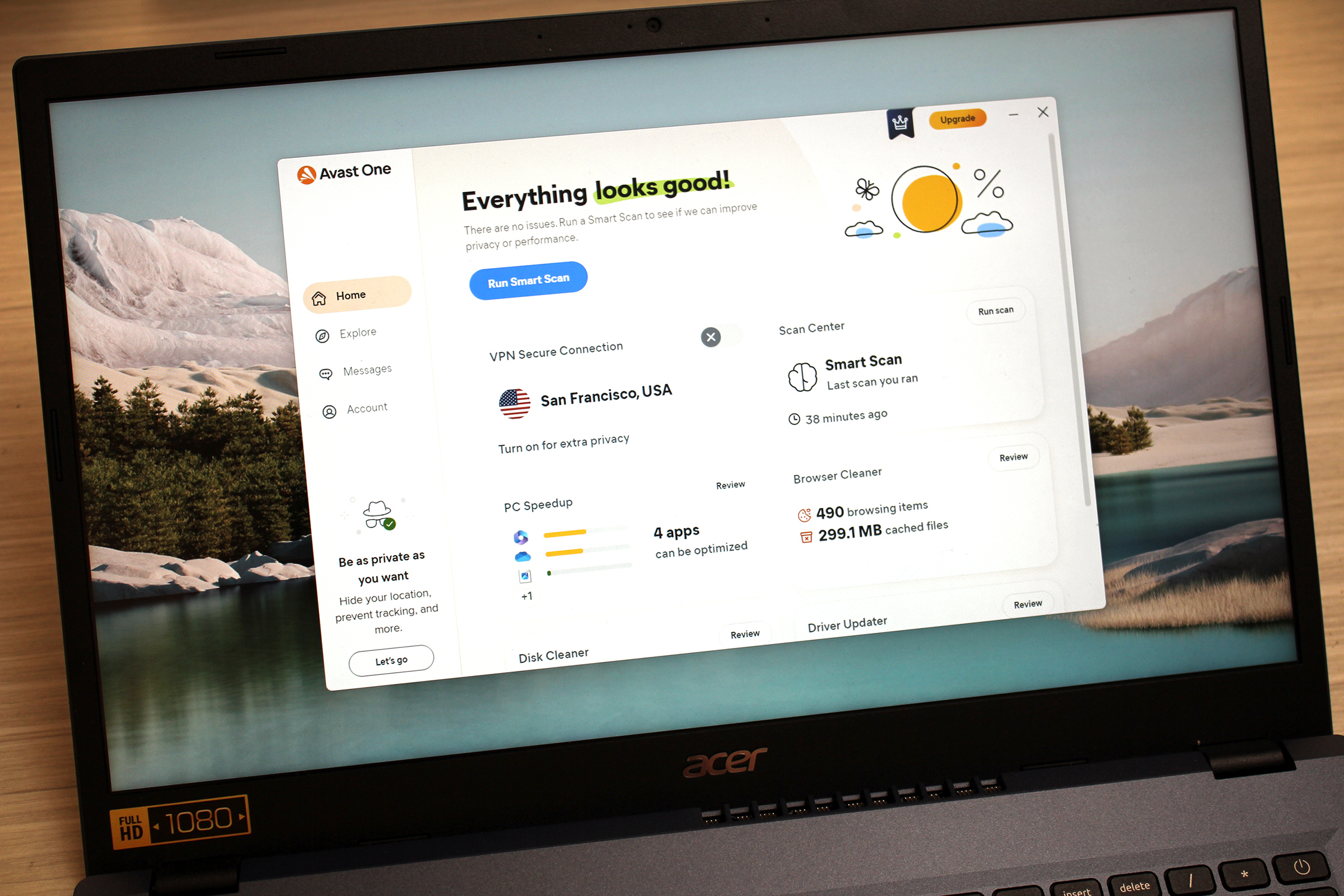
Pros
- Powerful, effective antivirus
- Great privacy tools
- Unlimited VPN usage
Cons
- No parental controls
- No password manager
Avast One is available for Windows, Mac, iPhone and Android.
It’s one of the easiest security apps to use, and gives you notifications that you don’t need a degree in computer science to understand. It offers excellent malware protection across all devices and has a decent VPN, too. That’s primarily a privacy tool, but it did also unblock BBC iPlayer in our tests. Oddly, it wouldn’t let us watch a different Netflix library to our home one, though.
The slightly confusing aspect of Avast One is that it’s free if you download the Essential version. The main limitation here is that the VPN will allow you to use 5GB of data per week only. That’s pretty generous compared to most free VPNs, but Avast does collect and store some data such as connection times and how much you download which isn’t ideal.
The paid-for versions of Avast One are available in Individual and Family subscriptions. The former lets you use it on five devices, and the latter up to 30. The weekly data cap is also removed from the VPN.
The fact you get so much for free with Avast One Essential makes it hard to recommend paying for it, and it’s worth noting that even the paid-for versions don’t have a password manager or any parental controls. The suite includes basic ID protection that tells you if your email address has been included in any data breaches, but you can get more robust ID protection elsewhere.
6. Eset Smart Security Premium
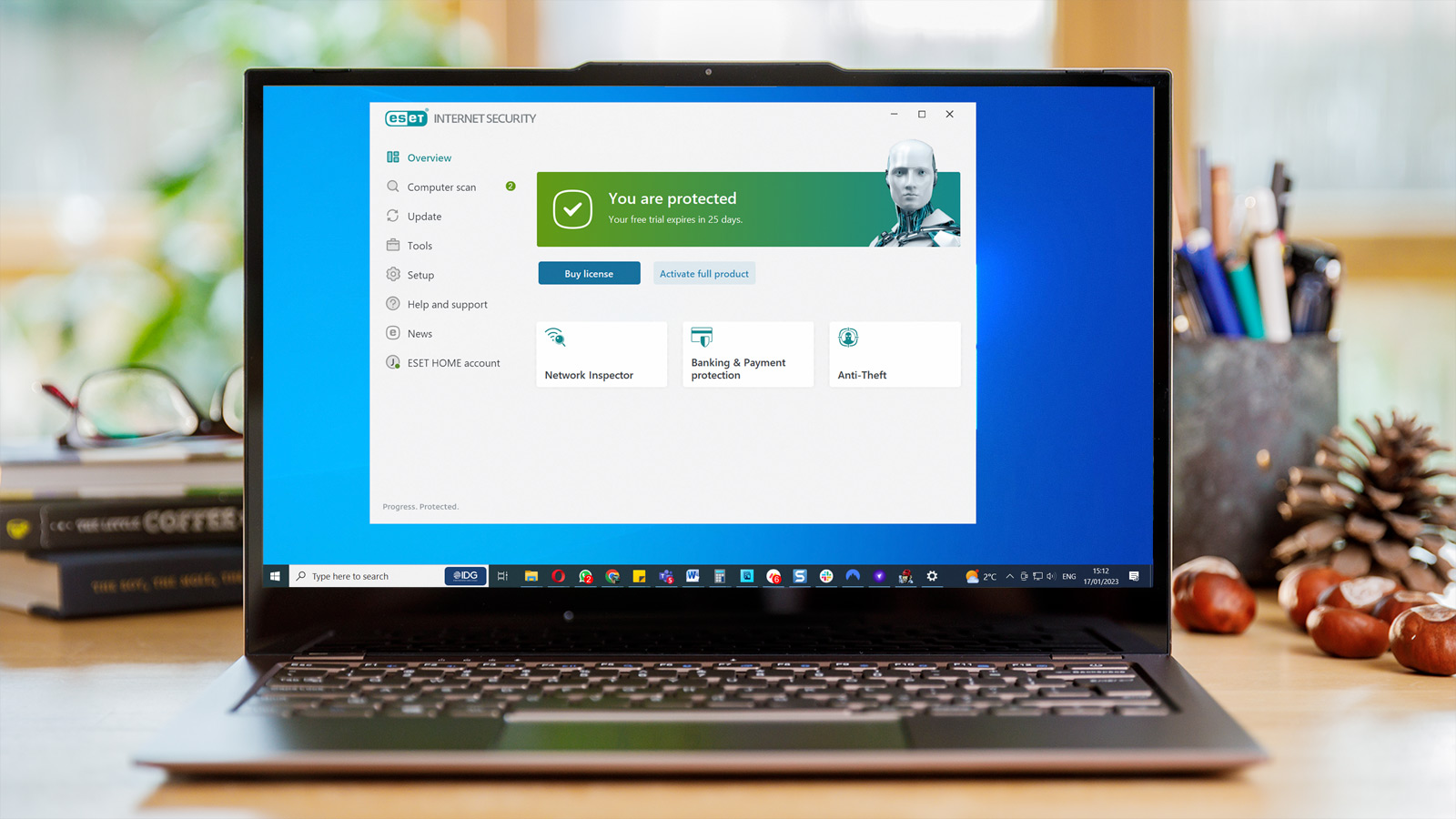
Pros
- Solid malware protection
- Lots of settings for power users
- Password manager included
Cons
- No ID protection
- No VPN
On the surface, ESET Smart Security has a simple interface that hides an impressive (but also hugely complex) raft of features.
Of these, only the poor parental controls and in-need-of-an-overhaul firewall configuration let the side down. And it’s worth noting that there’s no provision for identity monitoring / protection, nor a VPN.
Fortunately, the core malware protection – which includes anti-ransomware – is absolutely solid and while there is a bit of a negative impact on performance, the worst is when installing apps – something you won’t do all that often.
You can get ESET Smart Security Premium for £44.99 RRP for one device and one year. If you’re in the US, it’s $59.99. It’s inexpensive to add licences for extra devices, so it’s considerably better value if you need to protect more than one computer. If you don’t need a password manager or the ability to encrypt files, folders and USB drives, then opt for ESET Internet Security which is cheaper.
How to choose the best antivirus software
Security software, including antivirus software, detects, and then prevents, disarms or removes malicious apps or programs, which are often referred to as viruses.
While we still refer to it as antivirus, that’s only one feature of modern internet security software. That’s because security is no longer just about countering viruses. Although they very much still exist, viruses are just one type of the malware now prevalent on the web.
Arguably more important is security of your personal information and protection for your files from ransomware. Security exploits aren’t about show-off hackers massaging their egos anymore – just about making money.
The modern day criminal doesn’t have to be a hard-line hacker, either. They can buy all the software they need on the dark web to do it with almost no effort.
What you need to look for, then, is antivirus that will protect you from viruses, ransomware and other types of malware (such as spyware). The best also include ID protection, but some are much better than others. Check what they actually do: will they monitor for more than just a couple of email addresses, for example?
VPNs are often bundled with security suites, and you need to check how much data it lets you use per month or per day. Unlimited is best, while 200MB per day is not really useful at all.
It’s rare to find a bundled VPN that will unblock video services, but they do exist (such as McAfee’s).
Beyond this, pick antivirus with the features you want: parental controls, a password manager and other things. But, of course, read our reviews as well, as they will tell you if these features are any good or not.
How we test antivirus software
Why trust us? We install and use the software ourselves to evaluate the user experience, as well as testing out all the additional features which go far beyond viruses.
Testing the protection offered from malware, however, is a subtle art that requires serious expertise. For this reason, we use test results from independent testing houses, including the UK’s SELabs and Germany’s AV-Test.org and AV-Comparatives. Each rigorously tests security apps from a number of leading security companies.
The multifaceted testing procedure looks not only at how well an antivirus product can detect malware using traditional, largely signature-based methods (that is, employing a database of known malware types), but also how well it can block brand-new, unknown malware caught fresh from the wild. These companies also examine how well security products clean up after an infection if a piece of malware does get through.
We’ve focused on paid-for antivirus products here, but you can also get free antivirus. Paid-for antivirus usually offers better technical support and more comprehensive protection features than free ones, but some free packages can still give paid packages a good run for their money. Internet security suites go further still, offering firewalls, parental controls, identity theft protection and more.
If you’re looking to protect a Mac, most of the packages here will also work on Macs. But you can also read our sister site Macworld’s round-up of the best antivirus for Mac.

